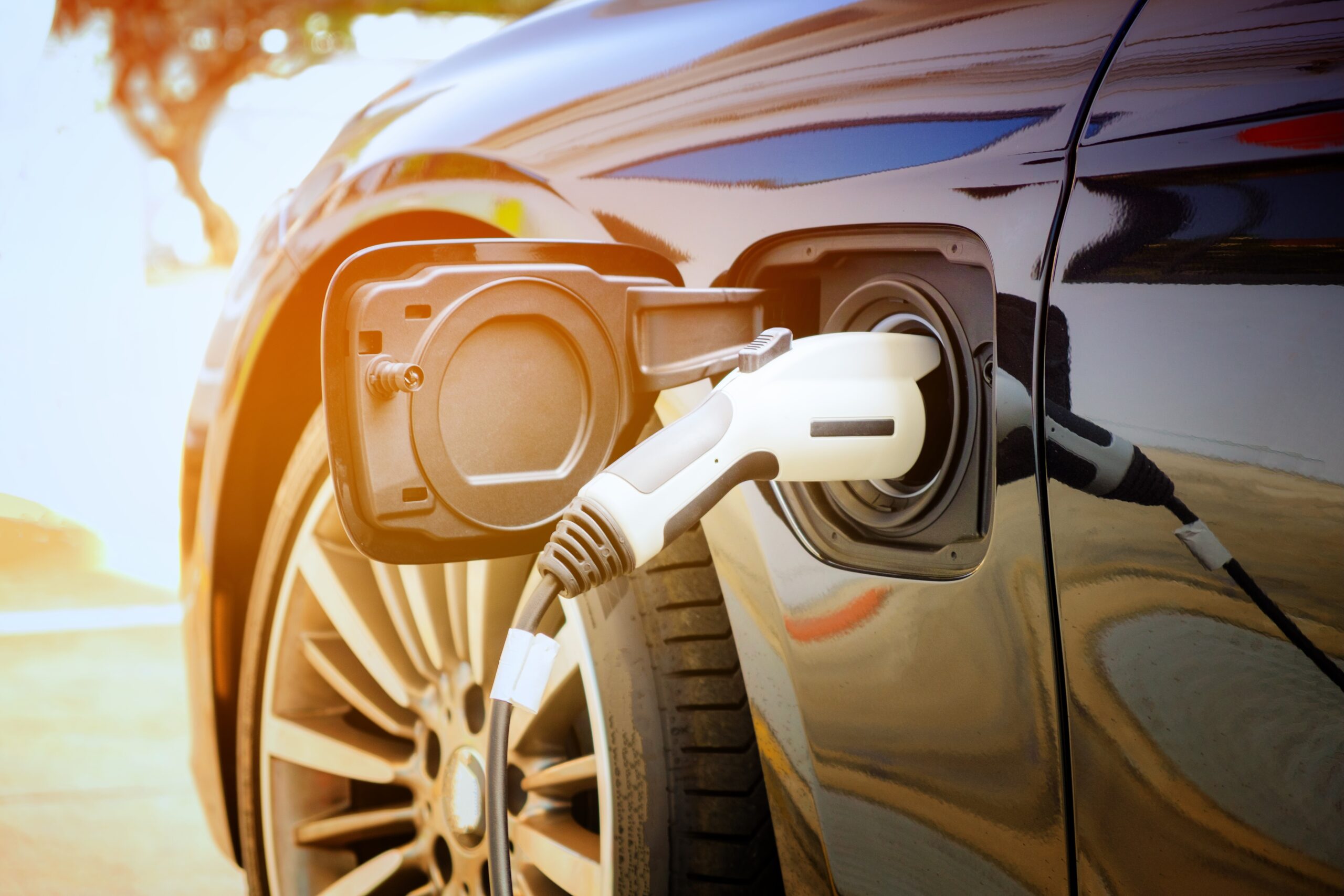Do Electric Vehicles Need Special Tires?

Electric vehicles (EVs) have become a common sight on the road, offering drivers an eco-friendly, high-performance alternative to gas-powered cars. As more EV models become available and more drivers make the swap, it’s crucial to understand the nuances of maintaining such vehicles, including one key question: Do electric vehicles need special tires?
The short answer: yes. Electric cars have unique design and performance characteristics that require tires built specifically to handle their weight, torque, and efficiency needs. Thankfully, with the increase in EV vehicle availability, many popular tire brands offer tires for electric vehicles.
At Telle Tire, our technicians understand the specific demands of EVs, from Tesla to Rivian and more, and can help you select the right tires to maximize performance, safety, and longevity. In this guide, we’ll explain why EV tires are different, what makes them unique, and how to choose the best tires for your electric vehicle.
Why Electric Vehicles Have Unique Tire Needs
EVs Are Heavier Than Traditional Cars
One of the most significant differences between EVs and gas-powered vehicles is weight. Electric cars carry large battery packs, which make them about 30% heavier than traditional cars. That added weight puts more pressure on the tires, requiring stronger construction and higher load ratings to maintain stability and safety.
Instant Torque Affects Tire Wear
If you’ve ever ridden in or driven an electric vehicle, you’ve experienced the quick acceleration. This instant torque is due to the electric motor’s ability to deliver power immediately. Additionally, many EVs are equipped with front and rear motors that work together to power all four tires, providing enhanced traction and power. While this gives EVs their famously quick acceleration, it can also cause faster tire wear.
Standard vehicle tires aren’t designed to handle that level of stress regularly, leading to quicker tread degradation and reduced traction. An electric vehicle’s tires require materials and tread patterns that are designed to provide extra traction capable of handling the instant torque. Without specialized tires, you may find yourself needing replacement tires earlier than anticipated.
Range Efficiency Is a Priority
Most EV car buyers choose these vehicles for their efficiency, and manufacturers have taken note, developing vehicles with extended battery ranges. Having the right tires for electric vehicles ensures you get the most efficiency possible. EV tires are made with special rubber compounds and lighter designs to ensure the car uses less energy to roll them down the road.
What Makes EV Tires Different?
Reinforced Sidewalls & Load Ratings
Because EVs are heavier, their tires are built with reinforced sidewalls and stronger internal structures to support the additional load. This added strength reduces the risk of blowouts, improves cornering stability, and promotes more even tread wear over time.
Noise Reduction Technology
EVs are nearly silent compared to gas-powered cars when running, which makes tire noise much more noticeable. To combat this, many EV tires feature sound-dampening foam liners or specially designed tread patterns that absorb vibrations and reduce road noise, helping to maintain the quiet, smooth ride that EV drivers expect.
Special Tread Compounds for Longevity
Because the torque from electric motors can wear out standard tires faster, EV tires utilize durable rubber compounds to balance grip, longevity, and ride comfort. The grooving and shaping of the rubber itself ensure that the tire offers reduced noise, improved wet traction, greater load-bearing capabilities, and the ability to handle instant torque. The specific rubber compounds also ensure maintained performance without compromising safety or efficiency.
Low Rolling Resistance for Efficiency
Every bit of energy saved helps your EV travel farther. EV-specific tires are designed with special rubber compounds and lighter weights for low rolling resistance, thereby reducing the amount of energy lost as heat and extending your driving range between charges. This reduces energy consumption and preserves battery range, a feature that standard tires can’t quite match.
Keep in mind, though, that while the low rolling resistance helps improve efficiency, it may also result in reduced traction. However, a tire’s rolling resistance can actually lower your vehicle’s energy efficiency if you’re not careful. It’s essential to consult with a tire expert to find the right tires for your EV that maintain a balance of efficiency and safety.
Can You Use Regular Tires on an EV?
Yes, But It’s Not Recommended
Technically, you can install regular tires on an electric vehicle, but it’s not recommended. Regular tires are offered in sizes that may fit your EV, but they are not optimized for the weight, torque and performance needs of an EV.
Using standard vehicle tires can result in faster wear, reduced range, increased road noise, and decreased vehicle safety.
Potential Safety & Performance Trade-Offs
Using non-EV tires can result in reduced braking performance and stability, particularly under load. The additional load of an electric vehicle may also exceed a standard tire’s load rating, making it more susceptible to damage or dangerous blowouts.
Warranty & Insurance Implications
Many EV manufacturers specify tire types or brands that are approved for use with their vehicles. Many car manufacturers will void the warranty if the installed tires do not meet the specific load capacity, speed rating, or other vehicle requirements. So, even if you’re experiencing reduced battery range or damage to other vehicle components, any necessary repairs will not be covered by the manufacturer if you have the wrong tires.
While there are currently no specific insurance requirements stating that an EV cannot use standard tires, installing non-EV tires could put you at a greater risk of accidents, which may increase your fees. Additionally, insurance typically does not cover normal tire wear, and if you need to replace tires more frequently, the cost will become significantly higher in the long run.
How to Choose the Right Tires for Your Electric Vehicle
Check Manufacturer Recommendations
The best place to start is your vehicle’s owner’s manual. Look for information on the original equipment tires, or original equipment manufacturer (OEM) tire specifications recommended for your EV model. The tires they recommend have been tested to deliver optimal range, safety, and performance for your specific vehicle.
Prioritize Load Index, Speed Rating & Tread Design
When selecting EV tires, pay attention to three key specs:
- Load Index: Must be high enough to support your vehicle’s weight.
- Speed Rating: Ensures stability and control at your EV’s top speeds.
- Tread Design: Choose from EV all-season tires, performance tires, or touring tires, depending on your climate and driving style.
Work with a Trusted Tire Shop
Choosing EV tires doesn’t have to be complicated. The experts at Telle Tire are trained to help you find the perfect tires for your electric vehicle. Our team offers personalized recommendations, professional tire installation, and ongoing maintenance to ensure your tires (and electric vehicle) perform at their best.
Common Questions About EV Tires
Do EVs wear out tires faster?
Yes. Due to their added weight and instant torque, EVs tend to wear out tires faster than traditional vehicles. Choosing EV-specific tires helps extend tread life and maintain consistent performance.
Are EV tires more expensive?
EV tires typically cost more than standard tires because they utilize advanced materials, incorporate sound-reducing features, and feature reinforced construction. However, their durability and efficiency help offset the higher upfront price over time.
How often do EV tires need replacing?
On average, EV tires may need replacement every 20,000 to 40,000 miles, depending on driving style and conditions. Regular tire rotation and proper inflation can help extend the lifespan of your tires.
Is EV tire maintenance the same as regular tires?
For the most part, yes, but EVs benefit from more frequent tire inspections due to their added weight and torque. Keeping tires properly inflated and balanced is crucial to maximizing range and safety.
Find the Right Tires for Your EV at Telle Tire
Whether you need help choosing new EV tires or require expert installation from technicians who understand the unique demands of electric vehicles, you can take it to Telle as your trusted tire partner.
Visit your nearest Telle Tire location in St. Louis, Kansas City, Springfield, MO, or Jefferson City, MO, to speak with our experts in person, or shop online to find the right tires for your EV.

Take it to telle
Stay Safe with a Tire Check from Telle Tire
Worried about your tread depth or tire condition heading into the summer storm season? Take it to Telle. Our expert technicians can assess your tires, check pressure levels, and recommend replacements when necessary, helping you stay in control regardless of the weather conditions. Stay safe, stay prepared, and if you’re unsure about your tires, schedule a visit with your nearest Telle Tire & Auto Centers location today.
Stay Informed
Recent Articles from Telle Tire

What Happens to Your Car When You Delay Scheduled Maintenance
It’s easy to push routine car maintenance down the to-do list. Oil changes, wheel alignments, tire rotations, fluid checks, battery tests, and suspension inspections often feel…

Winter Driving in Missouri: Top 7 Mistakes Drivers Make & How to Avoid Them
Winter in Missouri is anything but predictable. Drivers can experience early-season frost, freezing fog, sudden snow bursts, black ice on bridges, and wide temperature swings, sometimes…

Top Scenic Drives in Missouri This Winter
Winter transforms Missouri into a stunning landscape of snow-covered forests, frosted bluffs, quiet river valleys, and peaceful state parks. Whether you’re near St. Louis or Kansas…
